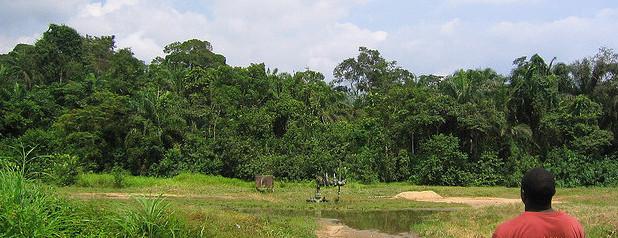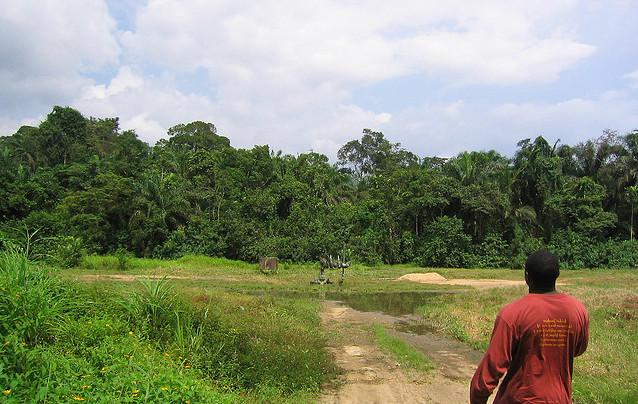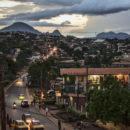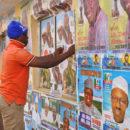Nigeria’s Buhari faces toughest of tests in the Niger Delta

The 2009 agreement stemmed the conflict, but left structural conditions unchanged. How will President Buhari handle ongoing grievances when the deal expires in December?
Nigeria appears to finally be making some inroads against Boko Haram, the Islamist militant group that has plagued it for years. But as one threat looks like it might be starting to recede, another may re-emerge: the conflict in the Niger Delta. That conflict is often forgotten in the shadow of Boko Haram’s headline-grabbing suicide bombings and kidnappings, but it now stands as a potent threat to Nigerian domestic security.
In 2009, before Boko Haram was a household name, Nigeria finally forged a peace deal that stemmed fighting in the southern Niger Delta, bringing hope that it would spell the end of a conflict that had displaced thousands and cost the Nigerian government an estimated $100 billion in oil revenue through bunkering. But that peace deal is set to expire this year, and the conflict could pick up where it left off “” taking the optimism brought about by the 2015 election with it.
Insecurity in the Niger Delta adds to a long list of concerns for Nigeria’s new President Muhammadu Buhari. He faces a delicate balancing act, trying to hold together a fraying country with strong regional identities. But unlike his predecessor, Goodluck Jonathan, Buhari seems ill-equipped to use the two main tools successfully wielded by the Jonathan administration to stave off conflict: patronage politics and paying off militants.
Both tools, applied strategically, were enough to stave off further bloodshed in the Niger Delta – for a time. The region comprises nine states that lie at the extreme south of Nigeria. Its residents long suffered from the social and environmental costs of oil production while getting little in return. From 2005 to 2009, these frustrations fueled a violent insurgency in which armed groups bombed pipelines and kidnapped foreign workers, while engaging in piracy and oil bunkering.
Then, a combination of military pressure and financial diplomacy exercised by Goodluck Jonathan – then President Umaru Musa Yar’Adua’s vice president – brought about an amnesty deal with the major militant groups. The attacks faded. In the short term, the amnesty package was successful in curbing the conflict. Yet, in its determination to pacify belligerents, the Yar’Adua administration missed an opportunity for long-term stabilisation.
The payments that were part of the deal are set to expire in December, and the structural conditions in the Niger Delta are unchanged.
Negotiating the Niger Delta
Looking to extend their stipends, former fighters are now threatening to end six years of relative peace. Before the election, Mujahid Dokubo-Asari, former leader of the infamous Niger Delta People’s Volunteer Force (NDPVF), threatened to remobilise his militia if Jonathan lost.
Just days after Buhari’s victory, attacks were launched in various states of the Niger Delta. In Rivers State, gunmen killed nine people, injured two others, and burned the home of a local politician. In Delta State, a nationalist group calling itself Urhobo Gbagbako blew up a pipeline to protest ethnic Urhobo marginalisation from amnesty contracts. Last month, two foreign workers were kidnapped in an attack in Bayelsa State. The attackers killed two policemen in the process. The armed forces have said that former militant youth are re-arming, and violence in the oil fields is on the rise.
In some ways, fighting Niger Delta militias could prove more challenging than fighting Boko Haram. The southern belligerents may not be as deadly as Boko Haram, but a resumption of the Niger Delta conflict would inflict more economic and political damage to Nigeria as a whole. Increasing violence in the Niger Delta would compound Nigeria’s fuel shortage crisis and hamstring the government’s revenue collection. Nigeria’s economy – already in dire straits due to low oil prices – is too fragile to withstand disruptions in oil production.
Additionally, the Nigerian government can expect little support from local populations against the militias. Unlike Boko Haram, whose brutal tactics have earned it few supporters – civilian militias were instrumental in pushing it out of occupied towns – the Movement for the Emancipation of the Niger Delta (MEND), an umbrella organisation of militias, is so popular that it has considered forming a political party.
Unlike former President Jonathan, a native of the region, Buhari comes from the extreme north of the country. He is regarded with little enthusiasm in the Niger Delta, the region where he faced the most opposition in the 2015 election.
Buhari first served as Nigeria’s head of state between 1983 and 1985, following a coup he orchestrated. During his brief stint as a military ruler, he waged a “war against indiscipline” in Nigeria. The programme extended to all spheres of society; commuters were whipped for cutting in line at bus stops and tardy civil servants were routinely forced to perform “frog squats”.
Buhari’s reputation as a disciplinarian bolstered his election campaign in which he promised to turn his strictness against government corruption. Since his victory and inauguration, he has put the issue of corruption front and centre. His delay in appointing cabinet ministers, his newly set up anti-corruption advisory committee, and his campaign to clean up the management of the Nigerian National Petroleum Corporation represent key examples of his stance on graft.
However, to prevent potential belligerence in the Niger Delta, the Federal Government has, in recent years, tolerated corruption among the regional elite. More importantly, as part of the 2009 deal, the government paid stipends to militants and awarded some groups contracts to protect oil infrastructure. Some of the most notorious groups were generously remunerated to protect pipelines they previously tried to blow up.
It is difficult to imagine Buhari accepting such arrangements given the importance of anti-corruption to his legitimacy. And even if he wanted to play the same cards as his predecessors, it would prove difficult.
Global declines in oil prices also mean that he will have far less cash than his predecessors to throw around. In the past year, the Naira lost 27% of its value against the US dollar. Additionally, Buhari has already had to bail out all of Nigeria’s 36 states. On 23 June, after meeting with state governors, he approved a payment package of roughly $2 billion, much of which came from the state’s natural gas company. With a slumping economy, the situation is likely to remain grim in the short-term.
Buhari has few good options. His northerner identity, his harsh stance on corruption, and his financial inability to maintain current stipend payments will reduce his leverage with potential militants. However, while fighting graft is key to Nigeria’s long-term prospects, its current economic performance depends on a steady and secure supply of oil.
Facing the militant violence brewing in the Niger Delta, on top of the full-fledged insurgency it is confronting in the north-east, will prove challenging for the Buhari administration. Whether attacks reach the scale of the previous insurgency depends somewhat on whether Buhari can improve the quality of life in the region and, more importantly, on the patience of local populations vis-í -vis his approach.
Dafe Oputu is an M.A. student at the Johns Hopkins University School of Advanced International Studies, with a focus on governance and political institutions in sub-Saharan African, particularly Nigeria. He has worked for the Atlantic Council’s Africa Center.
David Landry is a Ph.D. candidate at the Johns Hopkins University School of Advanced International Studies, where he researches the links between foreign direct investment inflows and governance in sub-Saharan Africa. He has consulted for the World Bank, the Natural Resource Governance Institute, and Transparency International.
To listen to a debate on Activism in the Niger Delta: Reflections on the past, present and future, click here. The event was hosted by RAS on 7 October to mark the 20-year anniversary of the execution of Ken Saro-Wiwa and eight other Ogoni leaders as well as to commemorate the untimely death of activist Oronto Douglas earlier in 2015.






The post is a good guide for Buhari on the expected hindrances to succeed in reinventing Nigeria of his dream and every Nigerian dream. However, the post failed short of advising Buhari on what to do and what not to do to overcome the expected impediment to his purposeful leadership dream.
It is unfortunate, Nigeria have a lot of problems, before Buhari was elected. However, he should try his best and live the rest for God. I always have no rest of mind thinking of Nigeria future. For peace, Buhari should settle the Delta militant as like former president, Goodluck Jonathan in order to avoid act of sabotage behavior, not only to the government, but to innocent individuals.
THE BIAFRANS SHOULD PULL OUT IMMEDIATELY AND FORM THEIR OWN NATION . NIGERIA WILL NEVER EVER PROSPER . ITS TIME THE NORTHERNS AND WESTERNS FIND SOMETHING ELSE TO EXPLOIAFRA MUST IT BESIDE OIL AND THE BLOOD OF INNOCENT BIAFRANS . THEY HAVE DONE THIS FOR OVER FORTY YEARS . THERE 65 MILLION PEOPLE IN THE EAST , AND THEY SHOULD JOIN HANDS TO SECEDE , NO MATTER WHAT . ENOUGH IS ENOUGH , BIAFRA MUST LEAVE NOW – THE ANOITED ONE
Corruption within Government institutes is the major factor for the worst situation being faced by Nigerian people. Most of the rich Nigerians are settled abroad. They use Nairaland to earn at any cost. Buhari must act fast to counter the corruption especially in the OIL & Gas Sector.
The North or South situation will improve if the people are given opportunities and support to settle financially.
There is no real unity or love among Nigerians different regions, but must significantly between the North ,on the one hand, and the South South and South East on the other.
Nigeria can only be saved by a painstaking re-orientation of the North against desperation for political power and dependence on the oil resources which come from the SE nd SS, however this may only take a miracle. Over the years, despite its long political control of the country, the North has continued to lag behind in development and awareness and consistently depending on historically false census statistics to obtain political and economic advantage .Recently, however, the SS and SE have become more politically agreeable, and the agitation for autonomy is rising along with the growth of highly technically and sophisticated militant gangs, with strong independent contacts, beyond national borders.
In the final analysis, the answer to addressing Nigeria problems, will lie with restructuring the country to give more autonomy to the regions, the more the world waits, the more serious catastrophe may be prevented. Nigeria needs help, now, beyond Buhari’s political capability.
There is no unity in this Nation called Nigeria. Everyone preach about Unity but in the real sense, there is nothing like that. I belief that the country will be united one day.
Unfortunately but realistically, Buhari does not now have the executive “powers” he had when he last led a successful coup in Nigeria.
In Nigeria’s national interests, he must not bribe any faction in order to achieve law abiding peace.
Our current No.1 Priority amongst others is conquering Boko Haram.
Then, we Nigerians must support him about controlling the GREED, AND, INSTITUTIONALISED MISAPPROPRIATIONS OF NATIONAL FUNDS(-seriously planning secession; demanding unfair budgetary allocations, even bribes, etc.) amongst ourselves – aided and supported by anti-Nigerian national and international banks and countries.
It is about time Buhari exploit exemplary Nigerians in The Diaspora who support his ethical standards.
A lot money is being pumped into this region (Niger delta) but few are pocketing it…. these people should be after those that is cornering their money….. one state in Niger delta receives money that would be enough for more than five states of south-east region, yet you see little or nothing meaningful in this region.